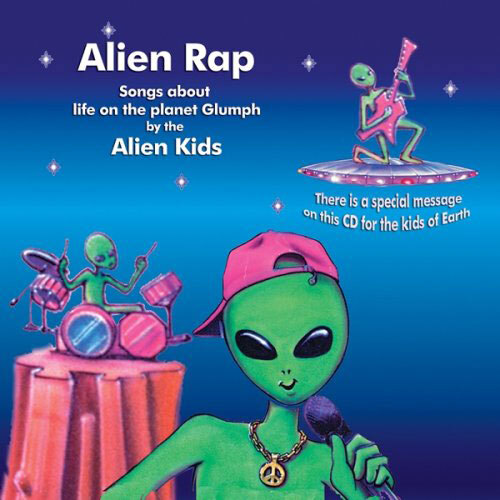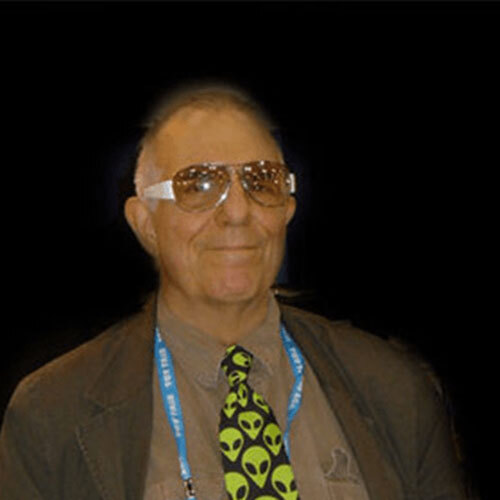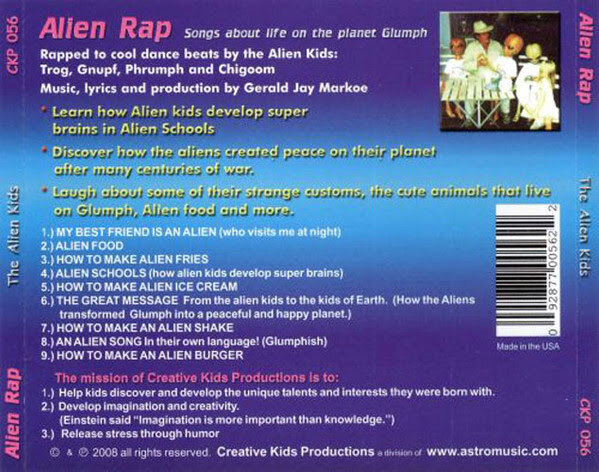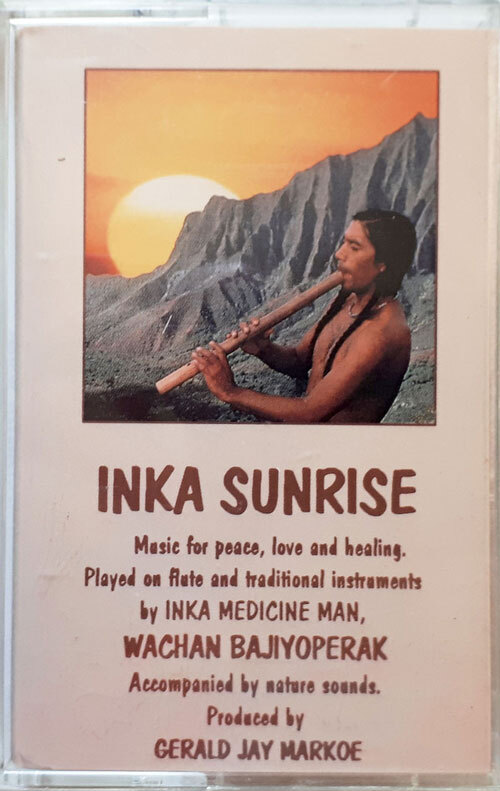Today in Tedium: A common practice on the website Rate Your Music is for two users to make friends and thoroughly investigate each other’s ratings. After I found Karan on a thread about personality types, I saw he rated a peculiar album 1.5 out of 5. It was called Alien Rap: Songs about Life on the Planet Glumph. The cover featured a cartoon MC alien with a backwards baseball cap and bling. “There is a special message on this CD for the kids of Earth,” said the front cover. I eagerly listened to the album and it surpassed all my expectations of weirdness and badness, and to this day I don’t understand why Karan doesn’t embrace it the way I do. But I’m grateful that he showed it to me because I ended up stumbling on a fountain of knowledge, much like an alien in a UFO investigating Earth for the first time. When I saw the creator of Alien Rap was a prolific creator of meditation music and that he died shortly after Alien Rap was released, I did some digging and was distraught to find that almost no information was out there. Soon, I found myself on the phone with the creator’s son. — Catherine @ Tedium
AMAZING CTO newsletter
The AMAZING CTO newsletter. You become a better engineering manager with articles and interviews tailored to CTOs. Enjoy entertaining technology every Friday. Cut through the noise. Learn from others and make your job easier.

Alien Rap: an odd album making the rounds in weird-music circles
Alien Rap is not exactly a rap album. The style is something between synth funk and space disco, crafted with the cheap plasticky sound of educational music. Nasally alien voices that sound like they were pitched up on Garageband speak in a lightly rhythmic rap with atrocious flow. The subject of the album is “songs about life on the planet Glumph,” and there’s lyrics about their joyful, relaxed work and school lives. Also, five out of the nine tracks are about their food, and it’s all junk food like ice cream, fries, and shakes. Everything they have on their planet is like ours, but it’s “alien”; the lyrics speak of alien teachers, alien corn, alien wood, alien cups, and alien ice without much further elaboration.
And it’s a good album. It may be kind of unpleasant to listen to, but it’s hilarious, and it’s creative almost all the way through. And while not as famous as other meme albums like Farrah Abraham’s My Teenage Dream Ended and The Shaggs’ Philosophy of the World, it’s slowly accumulating a following in its own right. Before we learn who made this and why, let’s get a closer picture at just how truly bonkers this album is.
A track-by-track breakdown of a truly unusual album
1. “My Best Friend is an Alien (Who Visits Me At Night).” This song is narrated by an anonymous adult human. According to this man, aliens don’t walk, they dance “to a happy alien beat.” The four singing aliens are introduced here—they are named Trog, Gnupf, Phrumph and Chigoom. They all kind of sound the same.
2. “Alien Food.” This track has some simple, slightly incompetent electric guitar going as the aliens pressure you to try their alien food, which they rub on their stomachs to eat.
3. “How To Make Alien Fries.” Making alien fries involves befriending a giraffe and stealing corn from their horns. It features the oft-quoted line “Taste this tasty goo.”
4. “Alien Schools.” This one is almost nine minutes long, yet it’s too short. In the words of YouTube commenter Jawblotz, “When Alien Schools ended I felt this strange empty feeling. Normally I don’t like repetitive songs but there’s just something about that song specifically that had me longing for it to continue on past its already 8 minute runtime.”
In the alien schools, everything is taught with games, and they only learn about what interests them. It’s similar to the homeschooling philosophy known as unschooling. The song’s sentiments are repeated ad nauseam in different ways.
5. “How to Make Alien Ice Cream.” This song sounds influenced by the Beach Boys and dub music.
6. “The Great Message.” This track is similar to Alien Schools but it’s about the entire alien society. As it turns out, the Glumphians are always so happy because everyone works for enjoyment and not for money (although they make a lot of it). The song, which is billed as a special message for every boy and girl on planet Earth, is glimmering, inspirational, and hopeful.
7. “How to Make an Alien Shake.” This song sounds the most similar to actual hip-hop. Specifically, it sounds like ’80s hip-hop. The shake sounds pretty gross. It contains cacti, giant ants, fish, and ground-up moose horns.
8. “An Alien Song (In Their Own Language! Glumphish).” It’s gibberish and nonsense sounds. It includes a part that my boyfriend called “mumble rap.”
9. “How To Make An Alien Burger.” A cacophonous song with too much percussion that seems way too derivative of the other food songs. Alien burgers are made from chicken heads, which spawn off of one another. Yes, this is the last song, the final concluding message from the enlightened alien society.

Gerald Jay Markoe.
Who made Alien Rap? A respected new age composer, it turns out
The album artist is “Alien Kids” and it is ostensibly the lone album released on Creative Kids Productions, although the Wayback Machine reveals that the label also released some Mozart performances for children. The album’s songwriting is credited to Gerald Jay Markoe, and upon research you will find that all his other albums were dollar-bin new age affairs with titles like “Celestial Mozart for Relaxation Vol 2” and “Sacred Music for the Seven Stars” (new age is a genre characterized by meditative works like these). They were all released on Gerald’s label, Astromusic (here is the long-defunct website). If you enjoy new age music at all, it’s good, but a bit hard to find online unless you pirate it. He also once co-wrote a successful musical called Charlotte Sweet which debuted in 1983. It was praised by Leonard Cohen and won three Drama Desk Awards.
Gerald was born in 1941 in Brooklyn; he attended Juilliard School of Music for his Bachelor’s and Manhattan School of Music for his Master’s (where his son, Jeremy, also attended). Gerald was an enthusiast of all things new age: aside from composing new age music, he loved yoga, meditation, studying traditional music from around the world, and going to new age conventions. His special focus was celestial bodies. A lot of his astrology-themed music was composed via “heavy-duty math” based on planetary relationships. People paid a lot of money to make music based on their astrological charts. His own Astromusic software did this same job via algorithm, but it was never updated past Windows XP. I can’t find evidence it existed anywhere on the internet, although Jeremy attested it was real.
Gerald worked as a children’s music teacher. A very effective instructor who would always get restless troublemakers to get themselves together and play as an orchestra, he would play a lot of wacky games with his classes to help them get the wiggles out. This practice often got him fired and as a consequence, he taught at many different schools in New York.
“As a dad he was a lot of fun,” Jeremy told me. “He let me do all the things that most parents would forbid. One time we were visiting friends overnight in Florida and they had a lake behind their house. There were maybe 100 frogs out there. The son and I decide to fill a box with these frogs and we brought them into the house. And then somehow the box gets turned over and they got loose everywhere in the house. I never saw [my dad] so happy in his life. Normally, if you brought your kid to somebody’s house, and they dumped 500 frogs in your living room, you’d probably be pretty concerned, right? I think the woman never asked us back.”
Naturally, the marriage between Gerald Markoe and Jeremy’s mom did not last for very long.
I asked Jeremy why Gerald made Alien Rap, and he said it was a fun spoof. Whether Gerald thought he was making cool beats or not, or actually entertaining kids or not, are details lost to time.

The back cover of Alien Rap.
Rumor 1: Alien Rap is cult-based (probably false)
In a popular review on Rate Your Music, user Bentouu noted that Astromusic’s PO box address was in Ashland, Oregon. He found that the box had also been used by other new aged-themed businesses; he theorized this could be linked to Emotional Body Enlightenment, a cult present in Ashland at the same time. Based on this, Karan posited Alien Rap might be some sort of brainwashing music to play on loop for a child.
My phone call with Jeremy neither confirmed nor denied this because I was too afraid to ask “were you guys connected with this cult?” But I felt like the answer was “no” when I learned that Ashland is where the Astromusic warehouse was located. They moved 250,000 units a year, and at $1,000 a month with employees included, this distant warehouse was a steal. Scandalous activity at the warehouse was probably how Alien Rap got to us, in fact.
The album was pressed onto CDs, but never formally released. “[The fame] is kind of shocking to me because it was just kind of left to die,” Jeremy says. Once digital downloads took off, Astromusic began losing a lot of money. Jeremy paid to have the stock destroyed, but he imagines a lot of it was surreptitiously sold off. This potentially allowed Alien Rap to escape into the world.
There’s also one album that should have slipped out with Alien Rap, but didn’t: Gerald once made an unreleased album called “Ew” with song titles like “The Burping Dance,” “Somebody Farted Game” and “I Love You Booger Girl.”
Rumor 2: Alien Rap advocates for ethnic cleansing (mostly false)
On Rate Your Music, one review by utolso_nyoma attests that the album includes messages about ethnic cleansing.
“For example track 6, The Great Message (How the Aliens Transformed Glumph Into a Peaceful and Happy Planet) begins with the line ‘Glumph has very low crime rates, because we racially segregate!’”
People on RYM and some of my friends were confused and believed the review, when in reality it was a dry attempt at humor. This is a fact I confirmed with the writer herself, whose real name is Jolene.

Wachan Bajiyoperak’s Inka Sunrise, produce by Markoe. (via Discogs)
While the ethnic cleansing sentiment is not present on the album, Gerald has allegedly made racist statements. In the 90s, Gerald signed Wachan Bajiyoperak, a Native Peruvian medicine man, to Astromusic. They released an album called Inka Sunrise. I contacted Wachan for what I thought would be a peaceful, harmony-tinged interview, only for him to release a torrent of repressed fury against Gerald.
“I met Gerald in 1993 while I was living [on] the island of Kawaii, Hawaii. He attended one of my concerts and he was fascinated with my music and who I was. He approached me and he proposed a recording deal, and we made an agreement that he was going to promote my record with his company. We made a contract that he was going to pay me 50 cents for each album he was going to sell.”
But Gerald ghosted Wachan after releasing the album, which was successful and sold thousands of copies. Eventually he came back: “He laughed at me and told me that I was a poor Indian that cannot afford money to pay the lawyers. And he was right. After two years he sent me a one thousand dollar check. I recorded 30 more hours of music later on—I found that he labeled it ‘Ancient Brotherhood,’ a collection of four albums with my music, and he didn’t even put my name on it.” [Writer’s note: I found six.]
I mentioned this to Jeremy, who remembers Wachan and found his anger not surprising in the least. Gerald burned bridges in almost every relationship.
“He had tons of adoring fans that thought he was the most peaceful, mellow guy in the world,” said Jeremy. “And meanwhile he’d be screaming at people in traffic.”
Gerald was interested in aliens as well as the cosmos. He owned a life-size alien doll—not one of those inflatables you see at music festivals, but a high-quality one you might see on a Hollywood set. He liked to drive around with it in his car, and you can see it on the back of the Alien Rap CD. In a photo of him I found online, he’s wearing a tie with green alien heads on it. Jeremy said that Gerald was keen on the idea of aliens being real and out there. Lovers of the new age have a tendency to believe in unproven things, and in the end, it was something unproven that triggered an untimely demise.
Gerald died in March of 2009, a little over a year after Alien Rap was released. He was 68. Technically, Alien Rap was not his final work, because there was another album that was never released. He died from a heart attack, although he had been suffering from prostate cancer.
“He could have had his prostate out at the very beginning,” said Jeremy, who pressured his father to take the medically sanctioned route without luck. “But he decided he was going to go granola, go to some yoga retreat, see a meadow and everything. Then the cancer spread. That was the end of that.”
While Jeremy says that thousands of people around the world do yoga and meditation to Gerald’s music every day, internet-goers may remember him more for “taste this tasty goo.” Although an ethically questionable man, may his twin legacies continue on like a slow-burning star.
--
Thanks again to Catherine for her excellent debut—and be sure to give Alien Rap a listen. Find this one an interesting read? Share it with a pal!
And thanks again to our sponsor, The Amazing CTO.




